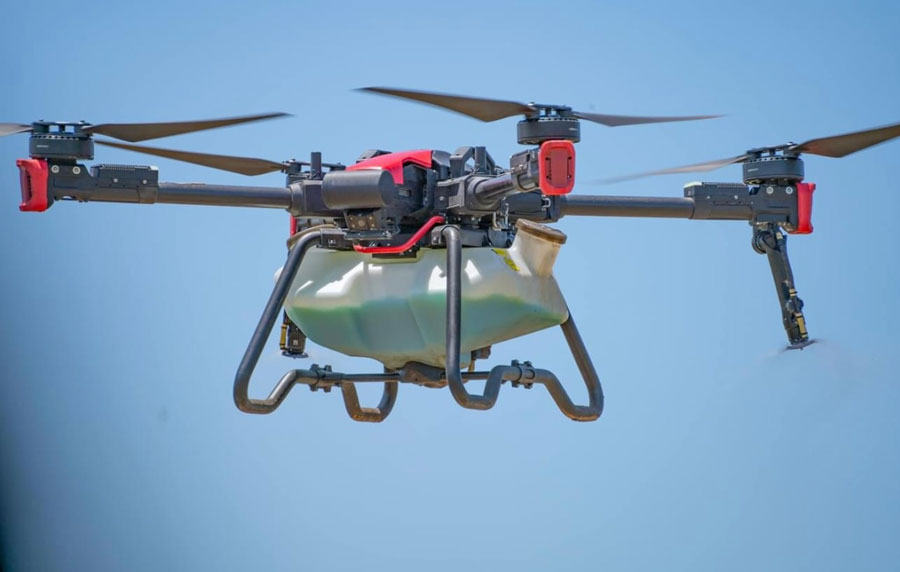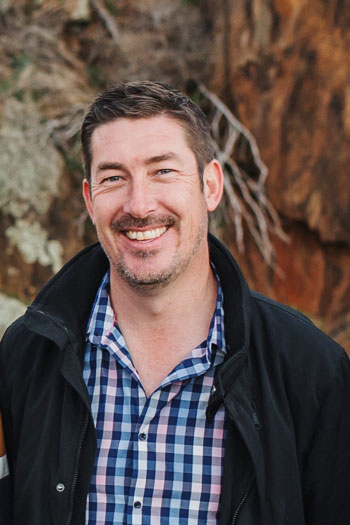Key points
- Kangaroo Island mixed farmer Paul McGorman has been awarded a GRDC-supported Nuffield Australia Scholarship
- He will investigate how drones can become an alternative piece of farm machinery
- Drones could play an important role in areas where undulating countryside, trees and wet weather make some paddocks impassable
When Paul McGorman’s faba beans were wiped out by Ascochyta blight in 2022 a question started brewing – could drones have helped?
The idea came about after an exceedingly wet winter made some paddocks on Paul’s 1100-hectare Kangaroo Island farm inaccessible. Fungicide spraying was impossible and a 95ha faba bean crop was lost.
This led him to successfully apply for a GRDC-supported Nuffield Australia Scholarship to investigate how drones could become an alternative piece of farm machinery.
Paul runs a mixed operation producing barley, canola, lupins, oats and tillage radish, as well as a 3000-head Merino flock.
The question about drones started as a joke, he says. “In 2022 we got very wet and had bogged ground. We could not get to some of the paddocks.”
Paul and his employees started considering options, including a lighter three-point linkage sprayer with flotation tyres. “And then someone made a joke about drones. I thought, ‘Well, let’s look into it’.”

Paul McGorman’s agricultural drone has already been incorporated into on-farm operations. It is 1.5 metres wide with a 40-litre capacity and is used for spraying. Photo: Supplied
He did and bought two – a larger agricultural one and a smaller surveillance drone.
The larger drone has already been incorporated into on-farm operations. It is 1.5 metres wide with a 40-litre capacity and is used for spraying. With an attachment, it is also used for baiting. “The drone did a great job of slug baiting in 2023. You can also use it for fertiliser spreading and seeding. It has a lot of different functions.
“We did in-crop weed spraying with it this year. We still have a ground rig that we did our pre-emergent sprays with, but most of the in-crop spraying was done with the drone,” he says.
Buying the drones and starting to use them was the catalyst for applying for a Nuffield Scholarship. “I want to ensure they are efficiently used.
“For example, where should our refuelling stations be set up and how should we organise our battery charging?
“We’ve sorted out a fair bit ourselves with trial and error. We used to go at 5ha/hour and now we can push it out to 10ha/hour. So, while we are improving some things, we still have more gains to make on our undulating, tree-lined country. But once we start to improve its efficiency, we will use it for most tasks.”
 Paul McGorman will explore whether drones can become an alternative piece of farm machinery via a GRDC-supported Nuffield Australia Scholarship. Photo: Supplied
Paul McGorman will explore whether drones can become an alternative piece of farm machinery via a GRDC-supported Nuffield Australia Scholarship. Photo: Supplied
While drones are being adopted across the grains industry already, Paul has realised first-hand that using them in a cost-effective way can be challenging. “The aim of my research is to make the use of agricultural drones feasible for all farmers.”
He sees agricultural drones as having many benefits, including improving operational efficiencies and access to paddocks, and boosting employee and contracting options.
“Drone use means that you can employ people from non-agricultural backgrounds. It also offers contracting opportunities. We’ve had a lot of enquiries, but we have not gone down that path because we are busy enough. But you could be a drone pilot and work half on your own farm and half in contracting.”
Paul plans to visit the US, where drones for agricultural purposes have experienced a huge growth in popularity. He’s also interested in travelling to China, where some major brands are produced and used, as well as France (which is the largest drone market), Japan, Thailand and New Zealand.
With plans to sell his Kangaroo Island property, the timing of his 2024 Nuffield travels should work out well.
Paul took on the Kangaroo Island property as part of his family’s succession plans. However, living on South Australia’s mainland with wife Kimberley and three children means a property there makes more sense. He is looking to be near the Barossa Valley.
“We’ve owned the Kangaroo Island farm for eight years and it has traditionally been purely used for grazing. After the bushfire in 2020, we lost about 20 per cent of the ground cover we had. So, we’ve been quick to sow some multi-species crops, which we’ve just had such positive results with.”
It has prompted Paul to consider more cropping. “I’ve always been very interested in the cropping side of things, so when we took over the farm we introduced more cropping elements and now it is half cropping and half Merino.”
He hopes to continue more cropping options with a new mainland farm, with drones helping along the way.
More information: Paul McGorman, [email protected]
Nuffield scholars set to tour the world
Nuffield Australia has announced its newest batch of scholars, who each receive a $35,000 bursary to invest in travel and research.
In the next 12 months, 25 scholars will travel the world studying topics including drought resilience, climate change, genetics, machine harvesting, and agricultural policy.
Scholars come from across the agricultural industry, with backgrounds in cropping, livestock, horticulture, fishing, and management.
Nuffield Australia CEO and 2013 Scholar, Jodie Redcliffe, says additional scholarships were awarded in 2023, largely due to support from the Australian Government's Future Drought Fund.
Five new Nuffield ‘Drought Resilience Scholarships’ have been awarded for 2024, with awardees Ben Poschelk, Caitlin Herbert, Claudia Benn, Michael Taylor, and Natalie Schlitz undertaking research, while GrainCorp is supporting NSW-based Katrina Swift to study the integration of AI and local data analysis.

























































